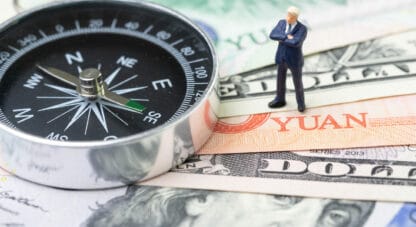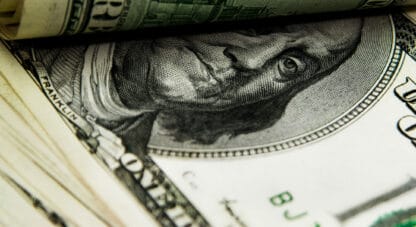About this week’s show:
- U.S. Tightening to be a Hangman’s Noose in Europe
- Massive Selloff coming in the Emerging Markets
- Putin’s True threat to the West: Cyber Attack
About the guest: Ambrose Evans-Pritchard is the international business editor of the Daily Telegraph. A long-time opponent of the EU's constitution and monetary union, he was the Europe correspondent in Brussels for the Telegraph from 1999 to 2004.
The McAlvany Weekly Commentary
with David McAlvany and Kevin Orrick
Kevin: Our guest today, Ambrose Evans-Pritchard, from the London Telegraph, of course, we have had on numerous times. We like his view because we are getting a European, or Englishman’s, view on Europe, on Russia, on the U.S. dollar. It is interesting that sometimes you have to change your perspective, step away from your own center of influence and step outside the room and look at what it looks like from the outside.
David: I think there are two perspectives that Ambrose brings in terms of his history of thought, which is, experience in the context of the cold war, and experience in the context of the creation of the euro as a project, so watching it sort of from inception forward, these are two things that he, I don’t want to say babysat, but as a writer, was certainly cognizant of and was addressing the controversial issues, and has been addressing them for the last 30-plus years.
Kevin: I think it is worth pointing out that he was very vocal against the euro. Britain, still, is on the British pound, and part of that, probably, was the influence of some of the press at the time that they were putting this together.
David: The idea of being a euro-skeptic is an interesting thing because on the one hand we’ve balanced out this perspective with having someone on like Franck Biancheri with the LEAP 2020 group in Europe. You have folks who certainly see greater integration possibilities and positive steps being made toward that, the euro-skeptic crowd, Ambrose being, I think, a part of that, would say, “Listen, you’ve got a political problem. In spite of having a European monetary union, you don’t fiscal and political union, and to cede sovereignty is something that will not happen as long as you have voter interest in play. We are talking about a world in which countries are still operating as democracies, then the popular vote is going to dictate that this is a failed project from the get-go, because at the end of the day, a Swede is a Swede, an Italian is an Italian, a Spaniard is a Spaniard, and you put enough pressure on any of these people and they are willing to take the general categorization of European and substitute the particular categorization of their own home country in its place.
Yes, pointing out in our conversation, the recording with Ambrose was done a number of days ago, and these are the issues that we see that are very important. Europe? Yes, there is still trouble ahead, and there are major hurdles to get over. Looking at the U.S., looking at our relationship with Russia, there is an issue in play, and the question is, how is it going to be resolved? Diplomatically? Would there ultimately be conflict? We won’t know, and even if we accelerate into more of a conflict militarily, we still don’t know if that is short-lived, one week, one month, five years. And there is this notion, too, I think we should remember from our own history and our own relationship with England, that size doesn’t necessarily matter in the context of warfare. It is how you attack, when you attack, the means by which you attack. I am one that would say, although Russia is small in comparison to the United States, roughly the size of California, California is the 6th largest economy in the world, so we are still talking about, on a relative basis, on a global scale, a very significant economy, perhaps not as grand or powerful as the United States, but again, what we’ve found in recent weeks is that, mysteriously an Illinois power terminal gets shut down remotely via the Internet. How does that happen, and who did it?,
Kevin: Yes, cyber warfare is one method that Russia has specialized in.
David: If we remember anything from jiu-jitsu or judo, the little guy sometimes has an advantage if he is leveraging your energy, and so what do we bring to the table that can be leveraged against us? I think these are things that we have to, at least, keep in mind as we consider Russia.
Kevin: Putting this in perspective, it is good to look at the context of the person we are talking to. That’s what we try to do with every guest, and Ambrose Evans-Pritchard can tell us what it felt like to be a European during the cold war. He really does not want to see that return. The same thing with the U.S. dollar.
David: In this interview I think the most critical insight that he brings is chaos in the emerging markets. He does tie that to the U.S. dollar. He ties it as a correlation, basically saying, cheap borrowed money went out from the United States and into the emerging markets, and what we are on the front edge of is capital controls as we see a meltdown in the emerging market, not only bonds, but equities, and a return of some of those dollars back into the U.S. milieu. What do we have there? Well, he thinks a dollar rally, a healthy dollar rally, perhaps a sustained dollar rally. I think it is worth noting that it is not that a dollar, necessarily, buys you that many more goods and services. We are talking about a dollar rally vis-à-vis a weaker euro and weaker emerging market or developing market currency.
Kevin: I think an important analogy would be guys jumping out of an airplane, parachuting, you might have some falling at a quicker rate than others, and that’s what happens with currencies. You may have the euro buying less and less and less each year. You may have the dollar buying a little more of less and less, and that is what he is talking about. A dollar rally doesn’t necessarily mean the dollar survives it is buying power.
David: From beginning to end this is a great interview. Stick with it. Listen to every detail.
* * *
There are many issues to remain aware of in Europe. Unemployment rates have been stubbornly high. We still have debt levels which are also high. Debt ratios now to GDP are moving higher due to very slow or morbid economic growth. There is a contrast between a more highly functioning north, or Germany, and a dysfunctional south. I think that’s easy for everyone to see, though Germany has its challenges, too. But into this you bring the issues of energy and security in relation to Russia. You first had Crimea, now you have Ukraine. Tomorrow we may see the knock-on effects from the glowing conflict between Azerbaijan and Armenia, and this is coming at a time when, frankly, Europe needs a tailwind. It is getting the exact opposite, another headwind to recovery, and you have a series of these headwinds to recovery.
Our conversation today with Ambrose Evans-Pritchard is to sort through a number of these issues and to pragmatically see what solutions exist. Of particular relevance for me, as a U.S. investor, in a fiat currency system, is the weakness of the euro currency, and the boost that that gives to the dollar, not in absolute terms, but again, relatively speaking, the dollar doing better relative to the euro. I wonder what has happened to absolutes. Everything is relative these days. Dollar vis-à-vis the euro, emerging markets vis-à-vis the developing markets, Germany vis-à-vis the peripheral European countries. What has happened to judging things on their own merits as opposed to these relative measures? When everything seems to be sinking, we seem to lose perspective.
Ambrose: That’s a very deep question. You’re getting into the issues of why we are in this mess in the world, and what’s been going on for the last 20 years that has caused this essentially low-growth trap we are in, and there are all kinds of causes. There are the distorted effects of globalization, the Asian savings glut, the world savings ratio has been rising every year to a fresh record of 25% of global GDP. That is basically taking money out of the system for demand, it is putting it into capital, it just floats around and causes bubbles everywhere. These are deep, deep themes in what has been happening here. Western central banks have been trying to respond to this with the old tools. They see a problem, they throw some stimulus at it, and it is quite understandable. The problems are intractable, they are so deep-rooted. We are now in a world where all this money that is being created is not actually creating inflation. As you can see, we are actually getting nearer and nearer deflation and they are not getting a lot of traction with these policies as part of the problem.
We may now be in a world where, and Larry Summers has been saying this, the U.S. needs interest rates of minus 3% just to be in equilibrium. In academic parlance the Wicksellian natural rate of interest has now fallen below zero. This is very, very extreme circumstances and we don’t quite know how to respond to it.
David: We have, on the other hand, the IMF fearing asset bubbles being promoted by ultra-low rates, and this is the opposite theme, central banks have been accommodative. They have been stimulating economies via low rates and implicitly taxing savers using low rates as a form of financial repression or income redirection. So, you have, on the one hand, central banks with low rates, they haven’t been able to accomplish everything that they have wanted to. We do slip toward negative growth rates in spite of what they are doing, and is it really possible to throw that much more stimulus at it and hope for a different effect.
Ambrose: This is really the Bank for International Settlements that has been pushing this theme really hard. They have come out with a series of reports and actually I interviewed the managing director quite recently and he was being incredibly, well, scary, frankly. They are basically saying that the central banks around the world have been blowing massive bubbles by keeping interest rates far too low. This caused the imbalances that led to the Lehman crisis, and it all blew up. Now they have done it again, except it is even worse this time, they argue, because they have drawn in all the emerging markets, as well, into the Ponzi scheme, so the entire world is leveraged to the hilt. They are arguing that not only have debt levels actually risen in the developed rich countries since 2008 to about 275% of GDP, they have also risen quite a lot in the emerging market countries to about 175% of GDP. I think about 30% of GDP for each block. So the whole global system is even more extremely leveraged than it was in 2008 when they said it was already dangerous, and basically, we are already seeing all the signs of all the froth, all the junk bond yields coming down to historic lows, all kinds of debt contracts, what I call covenant lights, very low protection, and sort of being issues, which basically shows that investors are reaching for yield on anything, accepting risk without asking questions. We’ve seen these volatility indexes fall again, also to historic lows, so they are arguing that we are primed, basically, for another massive crisis.
The IMF has been arguing the opposite case until recently, so you had a massive showdown between these two premier regulatory bodies of the global system, both essentially on the other side of the argument, fighting a quite tooth and nail battle. The IMF is getting a little worried I think and starting to hedge its bets. It has come out recently warning about some of the same warnings, more cautiously. The BIS is calling for rate rises, just burst the bubble, pop it, peg it on, head on, and if it causes a market crash, too bad. That’s their view. The IMF is not saying that, they are saying, “Well, okay, we need to watch it, we need to be careful. We need to use what is called macro prudential tools, which is where you are going to lean against the wind, you regulate the amount of mortgage credit, you regulate this, you regulate that, but you don’t raise the rates, you don’t tighten monetary policy. So they are not reconciled yet. The IMF is still saying, “We’ll keep the stimulus going,” but they are hedging their bets. You’ll recall, basically, the IMF did not see the whole Lehman crisis coming, and if you’re the premier regulatory body in the world, that’s quite a big one to miss, so they are slightly worried that they may be caught a second time, the whole thing blows up, and they didn’t see it coming a second time. So they are covering their bets right now.
David: Isn’t is interesting, though, that you have the two extremes of Larry Summers saying the only way forward is to move to a -3% interest rate, and on the other hand, the BIS would say to raise rates immediately to avert danger. You aren’t talking about unintelligent people on either side of the argument. It would seem, though, if you followed Larry Summers’ prescription, you end up with the IMF’s worst concern, BIS’s worst concern, a bubble of epic proportion, as if what we had today in the sovereign debt markets wasn’t extreme already.
Ambrose: In fairness to Larry Summers I don’t think he is actually saying that that should be done. He is saying we are in these really weird circumstances where, theoretically, that’s what you need, so what do you do about it? Well, in immediate terms, you deal with it through quantitative easing, which is a way of getting negative interest rates, in effect. It is not quite the same, but it is in sum the same effect. And in the case of Europe, of course, we are at the point where they have now got inflation, basically deflation, nipping them at the heels. It is down to 0.4%. They are only one shock away from a major tipping over the edge into a Japanese-style trap, and they may be getting that shock right now, as it happens. They are more in the BIS camp. They don’t want to be drawn into all of this. They are kind of holding back, holding back, and besides there is an internal problem because Germany doesn’t want it and Germany is the dominant voice and has a veto on policy. Germany is in a totally different place than the other economies. It can handle higher rates, and the others can’t, so there is a whole internal dispute about who runs the ECB. Is it a political animal or is it a real central bank, and all these questions. So, they are sort of paralyzed. They probably need to do QE immediately on a very large scale. I don’t suppose the hard money listeners will like to hear that, but that’s the general view among economists; they need to bite the bullet immediately.
The difficulty is, the point about QE is that QE works for the countries that do it, in the sense that they get out of the mess. It has worked in the U.S., it has worked in Britain, and to some degree it is working in Japan, but the jury is out on that. You get out of your mess, and you do, in fact, by not letting deflation take root by keeping inflation going you erode the real value of the debt, so your debt ratios do start to come down. The problem is, and this is what the BIS has been arguing about, it may work for one country in isolation, but this switches all the problem to somebody else. All the stimulus leaks out to other countries that can’t cope with it, it creates these massive bubbles all over the world, and then everybody is drawn into the mess. It is what is called a Pareto suboptimal, to use an academic term. It works, and in the end it comes back and it is worse for everybody, even worse for the countries that start it off and think they have gained a bit of advantage to start with, and in some respects it is a little like beggar-thy-neighbor devaluations in the 1930s. This is the argument that BIS is making. I don’t really agree with this, but I think it is fascinating, and they are very intelligent people, and Claudio Borio, the chief economist, he is one of the most brilliant economic minds in the world. I take them very, very seriously, but in the end, they aren’t the great minds and you have to choose, and these are very high stakes at the moment.
David: If Europe is essentially in a debt trap, adding new debt is not likely the answer to the problem. You have financial repression, you have inflation, you have debt rescheduling, and all of those have been tactics of the treasuries and central banks of the past. Should we expect to see more of this? As you said earlier, inflation is the taboo, the German Central Bank won’t have anything of it, and Draghi doesn’t mind if the euro dips lower for other reasons, but he is not willing to print. Are the other options sufficient?
Ambrose: Draghi desperately wants to do QE. He is desperate to do it. He desperately wants the euro to weaken a lot, but he is only the president of the European Central Bank, he doesn’t control it, ultimately Germany controls it, so what he is trying to do is talk down the euro while his hands are tied behind his back. He can’t actually do anything. Eventually this will happen, the euro will fall. But there is a point that sometimes needs explaining here. The debt ratios of southern Europe are rocketing, and they are rocketing even though they are doing austerity, like Italy. Italy’s debt ratio has gone up from 130-135% of GDP in one year, even though it is running a large primary budget surplus, even as it has been pushing one austerity package after another. It is in a vicious circle. In other words, a lot of the reason the debt ratio is going up is because of the austerity policies. It is a lethal mix of near zero inflation with recession.
David: Is the reason they won’t talk about rescheduling or restructuring because they have lost some autonomy in the midst of joining the European Monetary Union?
Ambrose: Well, you do lose all your sovereign control. You no longer have a central bank, you no long have a currency, you no longer really control your macroeconomic policy. But the difficulty is if you’ve got your own sovereign currency you’re not going to default, you’ll never default, because you’ll just print it.
David: Exactly, like we do.
Ambrose: So the issue disappears. It is only when you join a currency union that this issue of default, debt restructuring come onto the table, and this is what Italy is now caught in. Its ratio is shooting up. Let me just point here that every 1% fall in the inflation rate below the ECB’s 2% target means the budget surplus they have to run just to stabilize the debt is a 1.4% higher. This is the pure mathematics of it. And now they are at zero inflation, basically, so they have to run almost an 8% primary surplus just to stabilize the debt, and it becomes impossible. So the more the thing deflates, the more they get into a vicious cycle, the worse it gets, these ratios are rocketing up. Same in Portugal. They are heading straight toward debt restructuring and a massive sovereign debt crisis.
David: Yes, this is the argument of the liquidationists. Either you cancel or restructure. Markets have a very short memory of these things. I know that in Europe it is very taboo for a corporation to go bankrupt, but U.S. bankruptcy code allows for a person or company simply to start over, and shed the encumbrance. Europe used to do that, not in formal default, but through a currency devaluation. They can’t do that now, but it seems like with this issue, we are so close to a decision that could solve the problem, it is just not politically palatable.
Ambrose: You can deal with this two ways. You can simply have a higher rate of inflation and just gin up the money supply, do QE, get it going, do what the Japanese are doing, and you’d get Italy over the reefs. Italy would not have to default. If the whole policy structure in Europe were different, Italy would not have to default. It is only because of the policies they are pursuing, contractionary policies, that are driving them deeper into this mess. You can take the alternative view and say, right, okay, if we pursue hard money policy, we force a default. Okay, forcing a default in a country that has the world’s third biggest public debt, 2 trillion euros, which is what, 2.7 trillion dollars at this point, plus it wouldn’t be contained, because at that point, Portugal would go down too. I don’t see how you could separate Spain even at that point. You would be getting into a 4, 4-½, 5 trillion dollar sovereign debt default. At that point you would have an absolutely explosive global crisis. These are much bigger figures than Lehman, or anything that was happening then. Much bigger. We’ll leave aside China, which we will probably get onto. But that would be a massive shock to the global system. Besides, it would bring down the banking systems of Europe. I don’t know who could step in as a lender of last resort at this point because I think at that point the European Central Bank’s own credibility will be shattered and I don’t think it would be able to play the role that the Fed could play, because at the end of the day it doesn’t have any kind of government behind it. It is a kind of orphan central bank, it is a bit of a bluff. Sure, you can go that route, but be prepared for the consequences.
David: And it seems that that is what we don’t want to see occur, is anyone sort of live with the consequences. You have an investor class who owns a lot of bank debt, a lot of sovereign debt, and it is as if they have had a free pass. It is a one-way ride. You can go up, but it won’t go down. We have your back completely. I wonder if we are talking about concentrated wealth and the political inability to allow the chips to fall where they may. You look at the default recently of the bank in Portugal. I’d like to know who owns that bank debt, because someone was protected, and I don’t understand why moral hazard is perpetuated for the benefit of a few, when we are really talking about an impact that ultimately is for the Portuguese household. This is not some sort of a populaist rant, I am just wondering why there isn’t, in the marketplace, the good and the bad. Everyone knows that when you put your money down you can make money and you can lose money, except in this case, you can’t lose because central banks are afraid of this domino effect throughout the banking system. I understand they are trying to protect the banking system, but what about the investors in the banking system. Is there not some differentiation between the investors in bank debt, and the banking system as a whole?
Ambrose: Portugal is quite an odd case. We have these new rules coming in place in Europe, which is, essentially, all the shareholders and all the creditors, the bondholders, get wiped out before the taxpayer takes a hit. These are coming into force over the next couple of years, but basically, the principle is already laid up, and in this case, this is the first test case, and they panicked, and they backed away from it. They are imposing haircuts on the junior bondholders, but not on the senior bondholders. Now, they are arguing they don’t need to do it, and the taxpayer is totally protected. I don’t think any of the analysts I’ve talked to believe that. They think this is going to land on the shoulders of the longsuffering Portuguese taxpayer before this is all over. So I agree that somebody was protected here, the owners of these bonds. Now, why did the European commission sign off on this? It goes against their own principles. I think they are frightened. I think they are all worried that this could set off a chain reaction. They have got other things on their hands, they have got this Russia crisis welling up on them. Half of the eurozone seems to be either in, or very close to recession again. The whole recovery they were banking on has just sort of sputtered out. And they are worried. They are worried that this could just set off a fresh round of this thing. Despite their rhetoric that this crisis is completely over and they have solved the problem, they know it is not true. They know that it is still festering and it could come back and bite them at any time. I think that is what caused them to do this. But you’re right. Their intention is exactly what you say, to make sure that anybody who buys bank debt, they get wiped out if they make a mistake, if that bank behaves recklessly.
David: The intention, but there is many a slip between the cup and the lip.
Ambrose: But there is an interesting question internally in Portugal. There’s a big scandal about exactly who owns all this debt, and were they protected, and has the Portuguese Central Bank intervened in such a way to protect vested interests. In Portugal there is a separate scandal going on with that issue. We haven’t heard the last of that one.
David: So, we have Europe’s stalled recovery, we have Italy tripping into recession, triple-dip, so to say. Is Russia and Ukraine the easy political scapegoat for policies that have failed to revive growth in the eurozone?
Ambrose: It is Vladimir Putin who is setting the pace on this. He rewrote the borders of Europe by force. This hasn’t been done since 1945, by the way. The second time it was done, they did it in Georgia, but in Georgia people were still a bit stunned by it. It was only on a small scale. Now, he has just ripped up part of Ukraine and pocketed it in a way in which he massively misled all of the European and Western leaders in the process, so there is an incredible feeling of anger about it. He’s setting the pace. This isn’t some diversionary tactic by Europe because of its economic crisis. It is a diversionary tactic by Putin because of Russia’s economic crisis, the other way around. Russia has gone into deep structural decline. The latest IMF report on Russia is completely devastating. Its whole growth model is obsolete, it has picked all the low-hanging fruit it could get, it has massive structural problems. It has now become a victim of the Dutch curse, overreliance on commodity exports. The rest of its industry has been hollowed out. It is an economic basket case. And the problem is, it was almost in recession even before this whole thing erupted in Ukraine, and so quite clearly, Putin is motivated by a whole nationalist agenda, basically rebuilding, essentially, and informal, or actually formal, Russian empire, extending it back into areas of Eastern Europe that thought they had escaped it.
Now, you can argue from a distance, and I know people get very emotional about this on both sides, that he was provoked or something. I just don’t buy that. Frankly, Western Europe, the European Union is a pacifist status quo, declining organization, economy, society, couldn’t even say boo to a goose. It wasn’t even letting Ukraine in, it was trying to keep Ukraine out because it didn’t want the costs of Ukraine, it didn’t want all the massive immigration from Ukraine. It was trying to keep them friendly, but at a somewhat safe distance. The idea that they were about to take over and essentially absorb Ukraine into this Western NATO structure that posed issues, threat to Russia, I think is absurd. I know it has been widely claimed, but this is not the sequence of events that led to this. It was engineered at every stage by Russia, and we are now where we are, with 17 battalions of Russian troops massed on the border of Ukraine, with artillery, tanks, heavy aircraft poised. Well, we will see, we’ll find out. We might find out over the weekend what the next stage is. He only has a few more days to decide.
David: This is, to us, just one more finger of instability. It is not a defining factor in the world economy, but it is one factor, and you never know what serves as a trigger in an environment of general instability.
Ambrose: It is pretty big. The Ukrainian government is basically launching, right now, the battle of Donbas, to retake Donetsk, and Lugansk and this is the final showdown. It is happening as we speak, and will be going on for the next few days. Putin has to decide if he cuts his losses, accepts defeat, retreats back, essentially takes his proxy forces out, abandons the whole endeavor, in which case he would not survive in Russia, politically. He would be roasted by his own much harder-line nationalists than him. He has been trying to cover his flank against chauvinist factions that have been becoming very vocal in Russia so I don’t think he could survive and would have to abandon anyway his whole geostrategic strategy and his whole mission, which is essentially to reconstitute Russia as a great power, and as a great European power, not some Asian power. This is a fundamental clash of interests. He’s going to have to choose. Does he step back, just let it all happen? Now he has brought about … Ukraine had been in kind of a neutral state until then because NATO was not allowing it to join, and now, of course, it has become very, very hostile to Putin so he has brought about what he most feared, which is a hostile Ukraine. Now is he going to live with that? We’ll find out. Or is he going to double down and just invade? The outcome of that for the world economy and for the world strategic system is just enormous, because that then causes a whole chain of other things to happen. The BRICS, what position are they going to take on this? What position is China going to take on this? What position is Brazil going to take on this?
David: Let’s talk about that because there are these two themes that, in terms of the BRICS and the emerging markets, number one, we have the implicit loyalty of India, China, Brazil, South Africa, sort of the up and coming crowd, and they figure … collectively, we can be sort of chummy and stand toe-to-toe with the other great powers of the world. Collectively, we have a huge contribution to global GDP, even if singularly, it is less so. We have Fed tightening just around the corner. Why they chose October, I have no idea. If they looked at the Stock Trader’s Almanac, I think they would find that to be an absolutely absurd time to be pulling liquidity from the markets. Nevertheless, what are the impacts of this issue, Russia, concern about Russia, countries having to choose for themselves? What side are you going to stand on, a dollarized world or a non-dollarized world? And here’s the Fed tightening with ramifications for liquidity flows into the equity markets, the emerging market, bond markets? Talk about the ricochet effect.
Ambrose: Firstly, this whole question of the BRICS. To my knowledge there is no European country that has a claim on Russian territory. China has a very major claim on Russian territory that was taken from it in the 19th century in the Far East, and it wants it back. China and Russia are fundamental rivals in Central Asia. They have this battle going on over control of the gas reserves in Turkmenistan and several of the pipelines are now being redirected toward China and away from Russia; Russia is losing its control. They are rivals. They are rivals and we’ve been through this the last 60-70 years in the Soviet era, the communist era, when they seemed to be allies and there were all these pieties that made people in the West think they were close allies working together, when in fact they were at each other’s throats. I think there is an appearance of working together. China will quite clearly take advantage of any weakness in Russia for it’s own benefit, it will drive a really hard bargain. It is done that on the gas deal with Gazprom. It was signed in May. Russia capitulated completely, accepted terms that it has never accepted before, because it was so desperate. It needed the image of China coming in to save them in a confrontation with the West. That was very important to them, so they basically signed a deal in which they were going to lose money producing gas, essentially.
Sanctions essentially cut Russia off at the knees. They are frozen out of the global financial system. And these new sanctions are completely unlike any of the old sanctions of the 1990s or 1980s. There is this team at the U.S. Treasury that has been refining this for the last decade. They have a cell there working on this. They have tried it out on about nine different countries. They have brought North Korea to its knees, they have brought Iran to its knees. It works, it is totally different from the previous mechanisms. The thing about globalization, through control of the financial system, you have much more power. In a way, America’s financial power is as great now as it has ever been in history. That’s the irony, America may be, in other respects, in decline, but not in that area, and this is going to be absolutely devastating for Russia, and the Europeans have completely matched it, and in fact, exceeded it in some respects, and so have the Japanese. I think the question is whether the Chinese come in here and provide finance, and on what terms, and people will be looking very closely at this. My guess is that they are not going to do very much, and if they do, it will be on an excruciating cost for Russia. But again, they are going to have to decide. In the case of Brazil and South Africa, both by the way are either in recession, or near recession, both in structural crises, as is Russia. Do they really want to line up with Putin if he launches a full blown invasion of Ukraine? Do they really want to do that? What’s in it for them? It is a meaningless arrangement for the BRICS. They have a whole lot of interlocking relationships with countries around the world. Why would they want to sort of immolate themselves for the sake of Vladimir Putin? It just seems to me the whole thing is rather far-fetched.
Anyway, on the point about Fed tightening, the great issue about to hit the world is the moment in which America reaches what is called NAIRU [non-accelerating inflation rate of unemployment], when the unemployment rate falls low enough to start causing major wage pressures. We are getting very, very close to that, and we are already seeing many of the Fed hawks pushing for rate hikes, so I think Janet Yellen is going to have to come along very soon. Certainly by October they will have finished tapering bond purchases, and that, by the way, has a real money effect. They are reducing it by 10 billion at each meeting, essentially will be withdrawing 85 billion dollars of stimulus from the financial system by the time we get to October, compared to what it was before. We may find out that, actually, the American system needs that just to keep going. We don’t know yet. But in any case, they will be signaling tightening coming much earlier, signaling rate rises coming much earlier, and some are now talking about as early as probably April, early next year, which is a lot sooner than they had said. The Fed thought it would take about another 14 months for unemployment to get as low as it is now, so the whole thing has been pulled forward enormously. You could say that they are the victim of their own success. Great, unemployment has come down. There are all kinds of problems with U.S. job data, as you know, and huge kinds of disguised unemployment and that is all well known.
The difficulty for the rest of the world is, the U.S. can probably handle some monetary tightening, but can anybody else? This is likely to be similar, I think, to the early 1980s, and then to the mid 1990s, too earlier phases of Fed tightening, when the dollar started going up, a long secular dollar rally, and it just caught all these other countries that were a bit over-extended, had borrowed too much in dollars, suddenly caught them on the wrong side, and it had devastating effects as the Latin American crisis, of course the early 1980s and the mid-1990s it was the East Asia crisis, and then led to the Russian default, and then it ricocheted across the entire world by the time it had finished, and I think that is the risk we could be going into this. BIS is essentially 10 trillion dollars of cross border lending in hard currencies, mostly dollars, to emerging markets and that has risen from 4 trillion a decade ago.
David: So, a dollar rally is basically devastating to the emerging markets because of this 10 trillion dollar debt burden that they hold in dollar terms.
Ambrose: Yes, and there are particularly concentrated elements of this. For example, there is 1.2 trillion, essentially a carry trade, in dollars, from Hong Kong into China. The Chinese companies and banks are circumventing the internal credit controls in China by going outside the system and getting it from Hong Kong, they got it in dollars, and at that point they thought the dollar was going to weaken and the Chinese yuan was going to get stronger and stronger, so they thought it was a one-way bet. Huge amount of flows going this way and of course, that could reverse and become very, very nasty. Now the yuan has actually fallen this year against the dollar, but if you have a really major dollar rally you could have a huge squeeze, and I know they are very worried about this, the BIS, the IMF, Bank of England, they are all extremely worried about this. This could be one of the big triggers, and of course, the whole scale of the credit bubble in China is so huge that it has global implications at this point.
David: I want to go back to what we were talking about earlier in terms of the U.S. Treasury and the pressure that we are bringing right now on Russia, because the emerging markets I don’t think we have finished with, but I wanted to ask a question: If in fact Treasury is operating like the Department of Defense, why wouldn’t Russia feel like they have been put on a war footing by what is being orchestrated from Treasury.
Ambrose: Oh, I think it is war. Yes, I agree, I think it is war. That is why I think people are remarkably complacent about it. I don’t think Russia can retaliate by financial and economic means. It is a minnow. It is economy is the same size as California’s. It is irrelevant. It is only relevance is it is oil and gas supply, which could be switched off. But it is not an instrument that Russia can use, because it would destroy itself very quickly. But Russia’s economy is tiny, so they are up against the entire OECD block who are essentially in complete unity on imposing sanctions – Japan, Australia, Canada. It is 2 trillion against 40 trillion. There is no match. It is asymmetric. Now, what he can do is counterattack in some totally different way. He could launch cyber attacks. The Russians are very good at that. It is believed they already shut down an Illinois water system in an experiment and now then you would be testing more to the American defenses. And there have been quite a few suggestions from, I believe, the head of the CIA, among others, testified to Congress, that they really don’t have adequate defenses at all and are particularly vulnerable to a major cyber attack. And if there is any country in the world that is capable of delivering that, I am sure it is Russia, although I don’t suppose the Chinese are slouches, either, at doing that.
So, yes, he will retaliate by some means where he can inflict a lot of damage. It is not going to be economic because he can’t inflict any damage economically. It will be something else, and would he do it? I think there is a very high likelihood he will, yes. So, you maybe make a slightly different point here, therefore should the U.S. Treasury have done this? That is a political judgment. He started it, and I just don’t accept the line that this is a U.S. coup in Ukraine, I just think that is asinine. The sequence of events, the U.S. is really trying to catch up with events in Ukraine. It was behind the curve. It wasn’t in control, and it has been struggling to catch up ever since, so it is clear to me who began this thing. We are going to argue about this forever in the West. I came at this with a relatively neutral view, but events have just escalated so fast, and then when Yanukovych in Ukraine opened fire and massacred 100 of his own people in cold blood, and the police refused after that to enforce the anti-riot actions and just melted away and the regime collapsed. Everything stems from that, and it is clear to me, I was in Ukraine actually last year, and it is clear to me that this was a spontaneous revolution. I don’t think the U.S. orchestrated it, nor caused it, or really had much influence over it at any point. It tried to gain influence, but didn’t have much. So, I don’t accept the arguments being made by many, including many in America, I note, that somehow the U.S. provoked this. I have to admit, I was a cold warrior in the 1980s, back in Central America, and I was very much opposed to what the Soviet Union was doing and what they were doing in Poland at the time, and I have a memory that goes back to what they did when they controlled these countries and how they acted, and it seems to me people rather too easily forget. It is only 23 years now since Russian forces and Russian security apparatus controlled half of Europe.
David: Sure. I would tend to agree with you, that the point of cause, perhaps, is one thing, the State Department’s position and willingness to pressure not only 23 years ago, but every year since then the U.S. State Department and CIA has pressed for advantages, and I can’t complain about the results. Living in America, the results have been splendid. It just does not do anything in terms of ingratiating us or creating a sense of global wellbeing. It is not how you foster fraternity. U.S. foreign policy has been anything but polite.
Ambrose: I think there were much more serious cases of that, the invasion of Iraq in 2003. That was one which caused a massive hemorrhage of goodwill for the United States worldwide and did huge damage. I think this is of a totally different kind. I think to most countries the U.S. is not the initiator in this, and is actually working very closely with Europeans. Putin’s attempt to split the Atlantic Alliance on this hasn’t worked at all. At the end of the day, the Europeans and the Americans are working very, very closely together and they have come up with very similar policies. His attempt to split the EU internally has not succeeded either. Essentially all the countries, even those who are much more willing to accommodate him are towing the EU line, now being determine by Germany, Britain, and France. In this case, Obama has pursued this quite gentle, step-by-step policy of escalation. I think it is very hard to say that they went out like cowboys.
I think what you are saying applies much more to the Iraq war. That was the moment of massive damage to U.S. credibility and its image as a benign force in the world. Massive damage. And quite apart from the consequences of that action, I don’t know what many of your listeners may have thought of this war, and I want to be very careful what I say, here, but just in terms of analyzing global diplomacy, that had a very, very dramatic effect. I was in Turkey last year and I was talking to government officials and diplomats there and the subject came up and I was just surprised at how even in Japan, which is a very close ally of America, even there people think it was just an absolutely a terrible thing to have done, it was just so foolish and so badly executed and conducted, and the diplomacy so badly handled. And that was the view in Japan. I think that part of the reason we are seeing such suspicion of American motives now in Ukraine is because of the legacy of that. People around the world are saying, “Well, you know, these bastards lied in 2003, they lied about Iraq. You can’t believe anything they say, they invaded another country.” That is a definitely understandable suspicion, but we are dealing with a totally different kind of administration. We are dealing with a totally different country, in my view. America has gotten overextended. It was a horrible war in many ways, terrible suffering for many of the troops that fought in it, and America is licking its wounds, and is pulling back, that’s how I read it. And it doesn’t really want to get entangled in all these things. I think it wants to stay clear. It has been very reluctantly dragged back into a conflict in Europe which it would far rather had never happened. And you could say, “Were mistakes made in the late 1990s in the way Russia was treated? Were mistakes made at that point in pushing for missiles to be reinstalled in Central Europe, in Poland? Were these mistakes? Was it a mistake to push NATO borders so far into parts of the old Soviet Union and the Baltic States?” You can have all this discussion, were those mistakes made, and then at that point, perhaps, although I don’t see how you could deny Latvia or Estonia the right to join a defensive alliance. I don’t see how you could impose that veto upon sovereign countries that are members of the European Union. How could you do that?
David: Sure. Well, let’s look to the end of the year, and what we see as some considerable challenges, both from a monetary policy standpoint, from a fiscal policy standpoint, the U.S. has made some progress, Europe still has some progress to make, China has its challenges ahead. It gets complicated when you bring in geopolitics, and not to muddy the waters with those issues, but just to say, there is heightened concern now because you don’t know exactly how political operators will choose. It is not just a matter of a monetary calculus or a fiscal calculus. There are also alliances to tend to and geopolitics makes that very, very sensitive. If you were to take a guess, not along political lines, but just looking at the global economy as we march into the third quarter and into the fourth quarter of 2014, what do we have in front of us?
Ambrose: We have a roaring dollar rally and this is going to be a long secular rally. This is going to run and run and run. And initially, maybe people can cope with it, I don’t know. But, as it becomes clear that the tanker is turning, the Federal Reserve, the whole American economy is turning into a tightening mode, and this stimulus is going to be drained back out of the global system, it is just going to send tremors through everything. We had a taste of this last year with the taper tantrum, the first hawkish talk from Ben Bernanke and it set off this massive flight from emerging markets, surging bond yields, and so forth. We had a second episode of this in January, but we haven’t had the real one. That was just talk. When we get the real thing kicking in and the real tightening and it is just going on for month after month after month, that is when I think they will start squealing, and we are going to see, I think, another big selloff in emerging markets, and we are going to see the ones that really haven’t made the grade, they haven’t developed viable, balanced economies, they have put off restructuring, they have essentially been exploiting a primitive form of catchup growth which made them look good for a while, but fundamentally they are stuck in a middle income trap and they have hit the buffers, they have hit the ceiling, it is going to expose all those countries, and I think most of the BRICS fall into that category, actually. And I suspect that the secondary effects of this will recoil straight back into Europe where European banks have much more exposure to emerging markets than American banks, and will be what finally causes the next stage, the bigger stage of the Eurozone crisis. I am not sure quite on the cycle you are saying, 3rd quarter, 4th quarter, or 1st quarter next year.
David: It could be the end of 2015.
Ambrose: Oh, end of 2015, yes. Well, by then we may well be getting into all of this.
David: What we have in the makings is a significant downturn in terms of global GDP, sort of the scratch in the record gets revisited in terms of weakness in the European banks. Emerging markets, we have U.S. investors and global investors who, on the basis of valuation metrics, have piled into emerging market equities on the basis of them being cheaper. Well, cheaper can get cheaper still, and there is a potential hemorrhaging coming in 2015 in terms of the financial markets, both debt and equity, with the financial system being subject to tremendous pressure. Now, your argument is that this redounds the benefit of the U.S. dollar as a safe haven play.
Ambrose: I think the rising dollar amassed a kind of short squeeze on all those [unclear] dollars, essentially, around the world. And most of international lending is still done in dollars, people forget that. We are still living in a dollarized world, so when you get a major dollar rally it just has all these chain reactions through the international credit system, and on the emerging markets. The IMF did an internal study. They concluded that roughly 470 billion dollars had gone into emerging markets as a result of QE-2 alone, that would not have gone there otherwise, and they are afraid that is essentially hot money that will just come out again as soon as you get yield differentials, as soon as you get rising rates in America and people pouring back in to take advantage of an American recovery.
David: Doesn’t this also argue for a period of time which is more reminiscent of the 1980s and 1990s when capital controls were far more common the world over, and where there were limits in terms of global trade and cross border trade because of restrictions in terms of currency controls? When you start worrying about hot money, and start worrying about a meltdown in your own economy, you start getting very defensive and you also start thinking in very nationalist terms.
Ambrose: Well, exactly. And capital controls are coming back into the frame. They are being talked about. Even the IMF is now talking about them as maybe necessary. So, this is a whole new language. We are sort of moving away on many fronts from the post-Cold War globalization era. It will probably be seen as a quarter century of an aberration, actually, in history, when we look back at it, when everything was completely open, because it does create all these problems, these massive flows of capital that countries cannot control. And so I think they will impose capital controls. I think you already saw it late last year after the taper tantrum I and II. You already saw it in certain countries, either partial or total, basically total capital controls in some countries were creeping in. I think about five different countries did it in different forms then. We are going to get a lot more of that. I might add that the Fed may back off again. Now, what happened with the first taper tantrum was that the Fed was so shocked by what they brought about, which was this massive selloff in emerging markets and the surging bond yields, that they backed off. They did not do the tapering in September, as expected. Do you remember that?
David: Absolutely.
Ambrose: And so they may back off again. Now, this time, they have Stanley Fischer as number two at the Fed, brought in from the Bank of Israel. He was an expert on emerging markets, precisely in order to try to avoid this, and manage this whole issue more carefully than last time. But at the end of the day, the Fed has what is called a closed macro economy model. It looks at the U.S. economy internally. It doesn’t really fully take into account what its actions are globally, and this has led to endless problems over the last few decades, and it still does this. And my guess is that it will conclude from its own model that the U.S. can handle timing. Until such a time when the devastation cost globally is so great, and the blow-back into the United States so acute, that it is then forced to retreat, and then we go back and what do we do? Do we stop tightening again? Do we even do QE-4? I don’t know. I think that may well happen in the end, if in fact they don’t, in fact, tighten, because they can’t.
David: Well, that is a clear possibility. These are absolutely challenging times to not only wrap our minds around, but be making decisions in the context of. We appreciate your writing in the Daily Telegraph, and reporting from a British/European perspective, many of the issues which are so cogent, and important for us to keep a bead on. We do appreciate your time, and your efforts ongoing, and look forward to continuing the conversation later this year, and into next year, touching base to see what you see.
Ambrose: Thank you very much. Very nice to be with you.
















